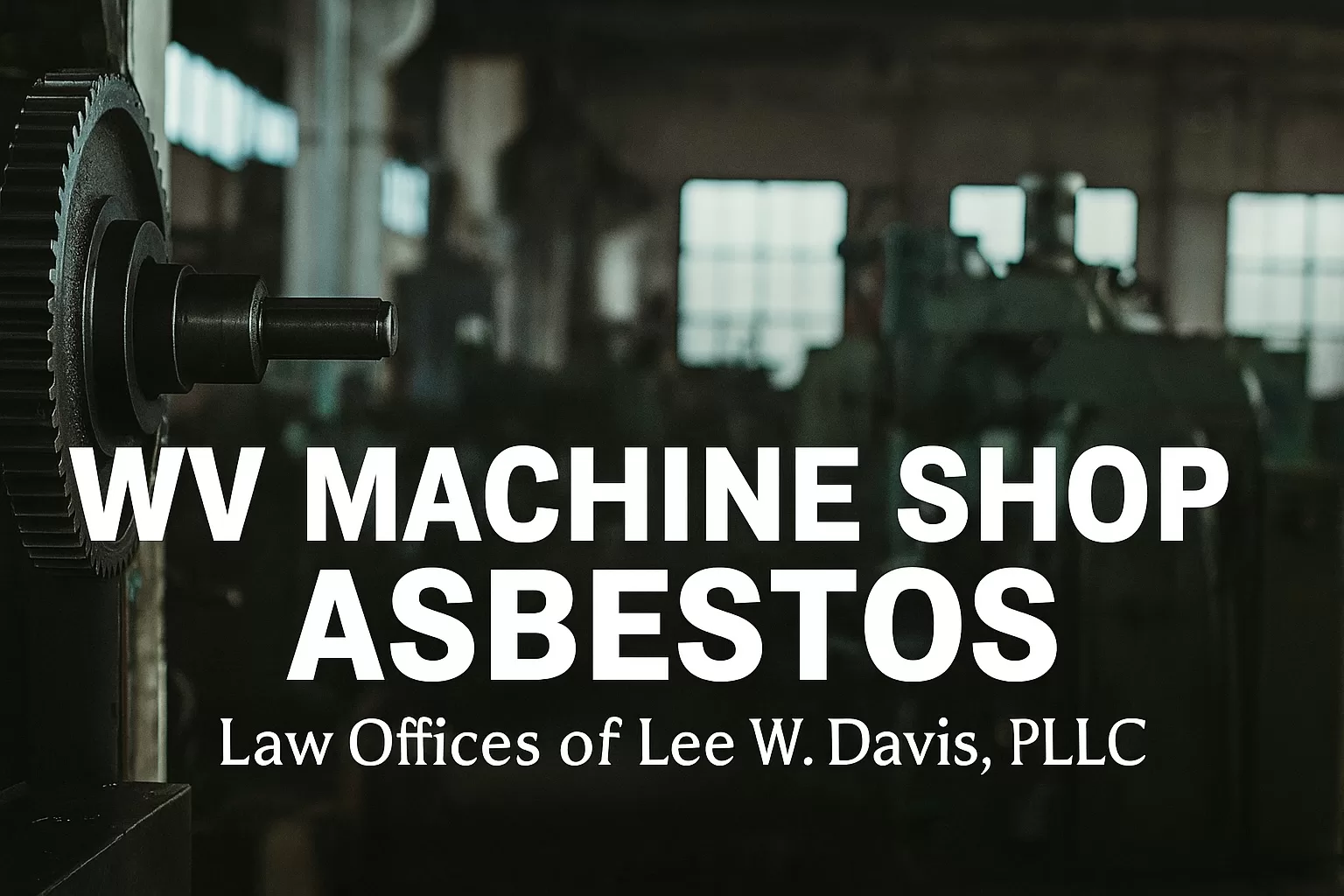WV Machine Shop Asbestos exposure was a silent danger for decades. From Huntington to Wheeling, machinists, millwrights, and tool-and-die workers routinely handled asbestos-laden materials while shaping and repairing industrial components. These microscopic fibers, once airborne, caused irreversible lung damage and deadly diseases like mesothelioma.
For generations, West Virginia’s manufacturing economy depended on precision machining. Yet the cutting, grinding, and heating processes inside these shops released asbestos dust from insulation, brake linings, and gaskets — contaminating the air workers breathed every day.
Why Machine Shops Used Asbestos
Asbestos was valued for its resistance to heat and friction. In machine shops, it appeared everywhere:
- Gaskets and seals in pumps, compressors, and engines
- Heat-resistant gloves and aprons used by machinists
- Insulation on boilers, pipes, and turbines near work areas
- Brake shoes and clutch facings for industrial equipment
Because the fibers were durable and cheap, employers relied on asbestos products long after health warnings surfaced. When workers sanded or cut these parts, the resulting dust stayed suspended in the air — turning small workshops into long-term exposure sites.
Common Jobs at Risk
Machine shops served nearly every major industry in West Virginia — steel mills, power plants, chemical facilities, and rail yards. Workers at highest risk included:
- Machinists and tool-and-die makers
- Millwrights and maintenance mechanics
- Lathe and drill operators
- Pump and valve repair technicians
- Equipment rebuilders and welders
Many machinists also brought asbestos dust home on their clothing, unknowingly exposing family members. Read about Take Home Exposure
Health Effects of Asbestos Exposure
Inhaled asbestos fibers embed themselves in lung tissue. Over time, this can lead to:
- Mesothelioma, a fatal cancer of the lung lining
- Asbestosis, a chronic scarring lung disease
- Lung cancer, often decades after exposure
- Pleural effusions, fluid buildup causing shortness of breath
Because symptoms may not appear for 20 – 50 years, many West Virginians are only now discovering illnesses linked to machine shop work from the 1970s, 80s, and 90s.
Machine Shops and Asbestos Manufacturers
Numerous equipment and parts suppliers knowingly sold asbestos-containing materials to West Virginia job sites. Components often came from national manufacturers of gaskets, insulation, and friction products. Even small, independent machine shops were affected because they sourced standard parts from large distributors who concealed the hazards.
When these shops performed repairs for companies like Weirton Steel, Ormet Aluminum, and Union Carbide, workers often machined or replaced asbestos-lined components supplied directly by major brands.
👉 Search Asbestos Job Sites in West Virginia
Filing a Machine Shop Asbestos Claim
If you or a loved one worked in a West Virginia machine shop and developed mesothelioma or another asbestos-related disease, you may be entitled to compensation through:
- Asbestos bankruptcy trust funds
- Lawsuits against responsible manufacturers
- Workers’ compensation or third-party claims
A skilled attorney can help identify which products and suppliers were responsible, even if the business closed decades ago. Asbestos trust funds still hold billions for victims who can prove occupational exposure.
Evidence That Strengthens a Claim
Successful asbestos cases often rely on:
- Detailed work history and jobsite records
- Coworker testimony describing exposure
- Product identification showing asbestos use
- Medical documentation linking diagnosis to exposure
Because machine shop exposure was widespread, many claimants qualify through trust-fund presumptions that cover industrial and maintenance occupations.
How Lee W. Davis, Esquire Helps WV Workers
Attorney Lee W. Davis has represented West Virginia asbestos victims since the 1980s — long before “mass tort” became an industry buzzword. His career began managing asbestos trials in Morgantown, running two courtrooms at once as a paralegal before becoming a lawyer in 1996.
Today, the Law Offices of Lee W. Davis, Esquire, L.L.C. continues that legacy, combining historic jobsite knowledge with modern digital case management. The firm knows how to match exposure histories to specific products, industries, and trust-fund criteria — turning decades-old memories into successful claims.
Filing Deadlines for West Virginia Asbestos Claims
West Virginia law imposes strict statutes of limitation on asbestos and mesothelioma cases. You generally have:
- Two years from diagnosis or death to file a lawsuit, and
- Three years to pursue certain trust-fund claims.
Because these deadlines vary depending on exposure site and claim type, early legal action is critical.
Protecting Your Family’s Rights
Families of deceased machinists can still file wrongful-death asbestos claims. These cases compensate for lost income, pain and suffering, and funeral costs. Even if the company no longer exists, many claims are payable through the national asbestos-trust system.
Free Consultation for WV Machine Shop Asbestos
If you or a family member worked in a West Virginia machine shop and later developed mesothelioma or another asbestos-related disease, you deserve clear answers and experienced representation.
Call (412) 781-0525 or visit leewdavis.com for a free consultation.
No fees unless recovery is made.
FAQs About WV Machine Shop Asbestos
1️⃣ Did small machine shops use asbestos?
Yes. Even small independent shops used asbestos-containing gaskets, brake pads, and insulation supplied by major manufacturers.
2️⃣ Can I file a claim if the shop closed years ago?
Yes. Claims are filed against product manufacturers or trust funds, not necessarily your old employer.
3️⃣ How long does it take to receive compensation?
Most asbestos-trust claims are processed within 6 – 12 months once documentation is complete.

